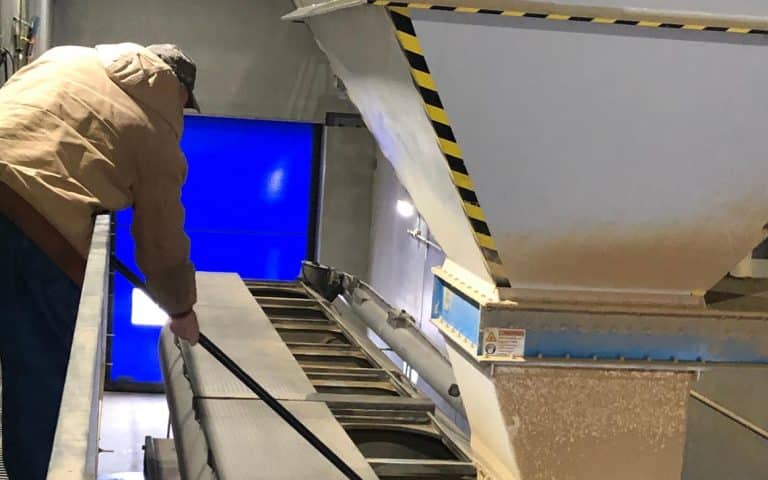WILLMAR–A new system for blending and loading poultry feed that was implemented late last year at the Farm Service Elevator in Willmar has already reduced time and increased nutrition options.
Research is now underway to determine if the projected growth and rate of gain for commercial turkey flocks is realized.
If it is, it could be a game-changer for the Willmar Poultry Company–which raises commercial turkeys and owns and operates the Farm Service Elevator–and other poultry farms which purchase feed from the elevator.
“The results look promising,” said Tom Scholten, business integration manager for Farm Service Elevator.
Located just off U.S. Highway 12 on the west side of Willmar, the elevator made a $4 million upgrade to its feed mill facilities in 2019.
Twenty steel bins with a 600-ton total capacity to store finished poultry feed were replaced with a precast cement structure with six bins with a total capacity of 1,300 tons.
The new, unique system allows the elevator more flexibility in blending different poultry rations to better fit the nutritional needs of turkeys during their different growth periods, Scholten said.
As turkeys age they are fed diets which gradually decrease in protein levels and increase in energy levels.
Typically, every time a change is made in an animal’s diet there’s a stressful adjustment period that can cause them to eat and drink less–which can slow down growth and result in birds being fed longer to reach market weight.
In the past the feed mill had eight different types of feeds that had different rations of protein and energy that were fed to poultry at different times of their growth.
Now they have 16.
Having more combinations of feed means there are smaller incremental steps in the diet, the change is less drastic for the birds and animals are “healthier and happier,” said Scholten.
In theory, the improved food conversion means the growth cycle won’t be interrupted, birds are fed for fewer days to reach market weight and less food is wasted, which creates savings for farmers.
With slim profit margins in the turkey industry, the savings could be significant for companies that raise millions of birds each year.
In December, Peggy Frederick, feed formulation supervisor for the elevator, began tracking the weight, growth and health of turkeys in the company’s barns to see if the theory is proven.
Scholten said by January of 2021 they hope to have enough data to determine the full results.
“We’re hoping we can help the farmers be successful, because if they’re successful–we are,” said Frederick. “If they aren’t, we won’t be.”
The elevator also sells feed for egg-laying chickens and breeder turkeys but those diets are typically not changed for adult birds.
The new system is also saving time for feed mill operators who can make and store large quantities of pelleted rations rather than juggling to fill and empty numerous small bins. Different amounts of the rations are blended to create specific diets for the birds.
The fun feature of the new system is how the feed is loaded into trucks that transport it to area turkey barns.
Trucks are given GPS units that track where they are on the route and what time they’ll be coming to the elevator to pick up another load. The operator gauges the arrival time–and the specific type of feed that hauler needs will be blended and waiting in the hopper for the load out.
Each truck has a radio frequency identification so the automated system, which is equipped with a laser, knows exactly where to position the funnel as feed is poured into different compartments in the truck.
There was a learning curve to using the system and there were a few loads of spilled feed, said Mike Heideman, feed mill superintendent. But after a month in operation it’s now going well and the load-out time has gone from 12 minutes to about 5 to 6 minutes.
With 260 trucks loaded each week, those extra minutes add up, said Heideman.
West Central Tribune by Carolyn Lange

